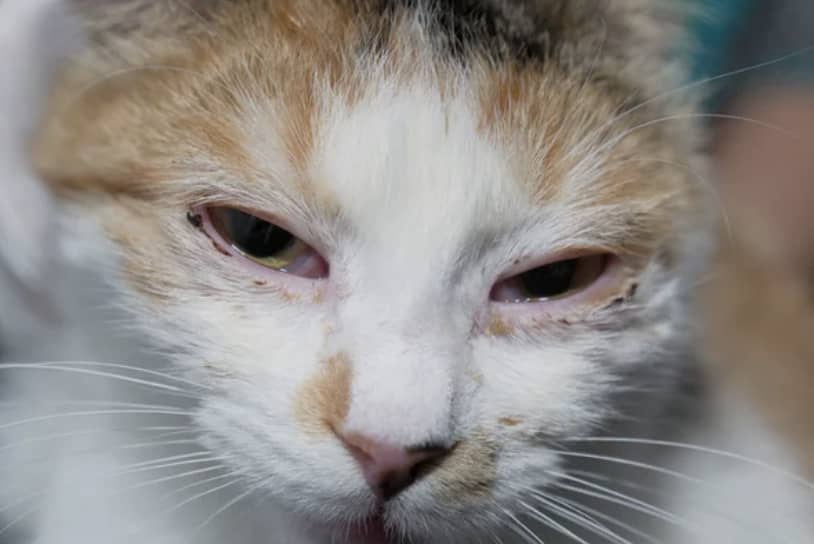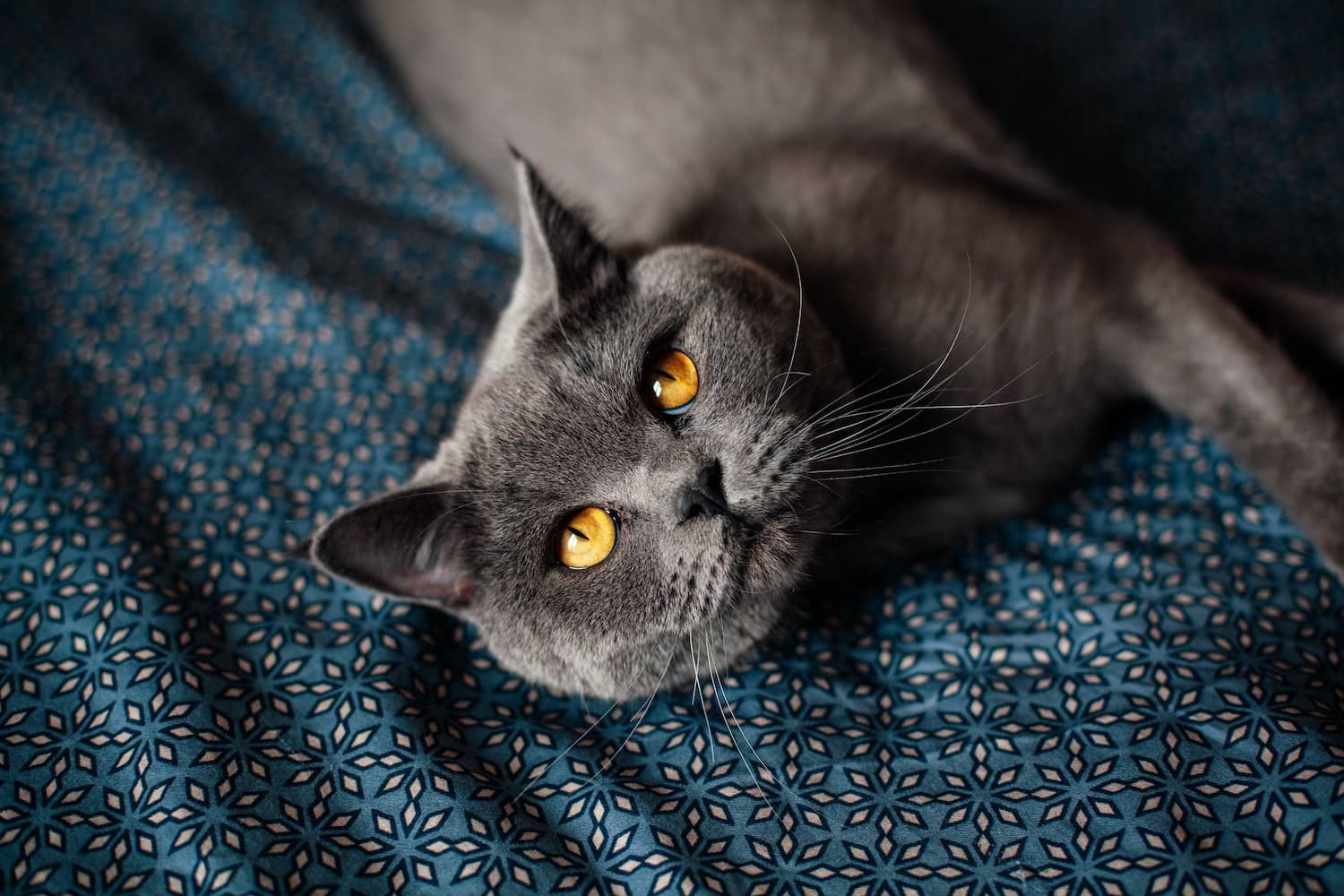Feline herpes is a common, contagious virus that can cause a wide variety of symptoms in cats. There are several different strains of the virus, but the most common is feline herpesvirus-1 (FHV-1). Recognizing the symptoms of feline herpes can help you get your cat the treatment she needs to feel better. In this article, we'll take a look at the signs and symptoms of feline herpes, as well as how the virus is spread and treated.
Feline herpes symptoms include sneezing, runny nose, eye discharge (which can be clear or pus-like), squinting, and lethargy. In more severe cases, symptoms can escalate to fever, loss of appetite, and notably inflamed eyes. Feline herpesvirus is highly contagious between cats and can cause lifelong infections with recurring symptom flare-ups.
What is Feline Herpes Virus?
The feline herpes virus (FHV-1) is a virus that commonly causes respiratory disease in cats. This virus is most common in young cats, especially those living in crowded environments. While cats who contract feline herpesvirus will often clear the infection, most will carry it for life.
Feline herpesvirus is one of the most common viral causes of sneezing and nasal discharge in cats, and it can also lead to ocular problems. This virus is very contagious to other cats but does not infect dogs or humans. Cats of any age can contract feline herpes virus infections, but younger cats are more likely to get infected before they develop immunity from vaccination.
How does feline herpes spread and what is its prevalence?
The feline herpes virus is mainly spread through contact with infected secretions from the eyes, nose, or mouth. This can happen when cats come into direct contact with each other, or when they come into indirect contact via shared objects such as food bowls or litter boxes. The feline herpes virus is fragile and doesn't survive for long outside of a host, so it's not commonly spread through the air.
Feline herpes virus is a common virus that affects many cats. It is especially common in multi-cat households, shelters, and catteries. Studies have shown that up to 97% of all cats have been exposed to the virus. Most cats who recover from acute infection become chronic carriers. The virus can remain latent for long periods of time, but it can start replicating again during times of stress or when the cat's immune system is weakened.
A detailed overview of the symptoms of feline herpes
The clinical symptoms of feline herpes can vary and often affect the ocular and respiratory systems. In the respiratory system, symptoms of feline herpes can include sneezing, nasal discharge, and wheezing. The virus can cause a wide variety of ocular symptoms, including conjunctivitis (inflammation of the eye), uveitis (inflammation of the iris), and keratitis (inflammation of the cornea).
The severity of symptoms of feline herpes can be very mild or very severe, and they often vary depending on the age and health of the cat. Young cats, immunocompromised cats, or cats with co-infections with bacteria are more likely to experience severe disease and symptoms. Additionally, it is most likely that kittens who recover from a feline herpes virus infection will become carriers of the virus.
Ocular symptoms of feline herpes
Many cats who are infected with the feline herpes virus also develop ocular disease, including conjunctivitis. Due to the cytotoxic effects of the feline herpes virus, corneal ulceration can occur which is very painful. Typical ocular symptoms of feline herpes include:
- Ocular discharge - may be clear or green mucous type discharge
- Redness of the eye
- Squinting (blepharospasm)
- Prominent swelling of the conjunctival tissues around the eye (chemosis)
It is also possible to have low-grade, persistent infections. This would explain why some cats with feline herpes virus have long-standing and intermittent ocular symptoms, even though they have never developed a severe case of conjunctivitis.

Respiratory symptoms of feline herpes
In addition to ocular symptoms, cats with the feline herpes virus can also experience a wide variety of other symptoms. These can include:
- Sneezing
- Nasal discharge
- Fever
- Lethargy
- Anorexia
In some cases, the feline herpes virus can also cause severe respiratory diseases such as pneumonia. If pneumonia is present, affected cats will show symptoms of coughing and difficulty or labored breathing. If you notice these symptoms, you should contact your veterinarian immediately as severe cases of pneumonia can be life-threatening.

How is the feline herpes virus diagnosed in cats?
A combination of tests, including a physical examination, history taking, and viral PCR assays may be used to help make a diagnosis. The PCR assay is a reliable way to detect the presence of the feline herpesvirus (FHV-1). This test can be used to identify FHV-1 DNA from oropharyngeal and conjunctival swabs, as well as skin biopsy material.
How is the feline herpes virus treated in cats?
The treatment of the feline herpes virus is largely supportive and depends on the symptoms that are present. There are no specific antiviral therapies available for cats with FHV-1 infection, but several medications used to treat human herpesvirus infections have been found to be efficacious in cats. Famciclovir is an oral antiviral medication that is frequently used in cats with severe forms of the disease.
L-lysine supplementation is a common therapy for the feline herpes virus. L-lysine prevents viral replication and can reduce the shedding of the herpes virus. L-lysine is well tolerated by cats and is readily available as an over-the-counter medication.
Antibiotics may also be used to treat secondary bacterial infections that may occur as a result of the herpes virus. These might be taken by mouth or applied to the eyes depending on the presenting clinical symptoms.
There may also be some benefits to taking probiotics. A study showed that some cats who were supplemented with a probiotic had reduced clinical disease.
If your cat is experiencing severe symptoms of feline herpes, it may require hospitalization for supportive care. This includes fluids, nutrition support, and treatment for any secondary infections. In some cases, a cat may require oxygen therapy if they are having difficulty breathing.
What is the prognosis of cats with herpes virus infection?
The prognosis for cats with symptoms of feline herpes virus is generally good, but it is important to seek veterinary care if you think your cat may be infected. Early diagnosis and treatment can help improve the chances of a full recovery.
Most cats with signs of upper respiratory disease improve within 7-10 days with supportive care. However, fatalities can occur, especially in kittens or immunosuppressed cats. Cats that recover from an acute FHV-1 infection might develop long-term chronic disease and have recurring clinical symptoms in the future.
What are the preventative measures for cats with herpes virus?
There are 3 facets to the prevention of the feline herpes virus: Isolation of ill cats, minimizing predisposing factors, and vaccination.
1. Isolation of ill cats
If your cat is confirmed to have the feline herpes virus, it is important to keep them isolated from other cats. This will prevent the spread of the virus and minimize the risk of other cats becoming infected.
2. Minimizing predisposing factors
There are several things you can do to help minimize the risk of your cat contracting the feline herpes virus. These include:
- Keeping your cat indoors
- Avoiding close contact with other cats, especially in areas where there is a lot of shedding (eg. catteries, shelters)
- Cleaning your cat's environment regularly to reduce the number of viral particles present
- Vaccinating your cat against the herpes virus
3. Vaccination
The most effective way to prevent your cat from contracting the feline herpes virus is through vaccination. It is important to note that while this vaccine prevents or minimizes clinical symptoms but may not prevent infection. There are also several other viruses that can cause symptoms similar to FHV-1, so it is important to discuss your cat's risk of exposure with your veterinarian.
Symptoms of the feline herpes virus can include fever, sneezing, runny nose, conjunctivitis, and lethargy. The virus is highly contagious and can be spread through close contact with infected cats, or exposure to areas where there is a lot of shedding (eg. catteries, and shelters). Early diagnosis and treatment are important for improving the chances of a full recovery. There are several things you can do to help prevent your cat from contracting the virus, including keeping them indoors, avoiding close contact with other cats, and immunizing them against the herpes virus. If you have any questions about the symptoms of feline herpes in your cat, please contact your veterinarian.


